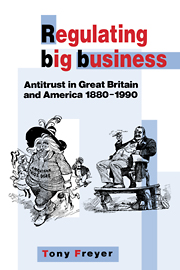Crossref Citations
This Book has been
cited by the following publications. This list is generated based on data provided by Crossref.
Grandy, Christopher
1993.
Original Intent and the Sherman Antitrust Act: A Re-examination of the Consumer-Welfare Hypothesis.
The Journal of Economic History,
Vol. 53,
Issue. 2,
p.
359.
Gerber, Larry G.
1994.
The National Industrial Recovery Act in Comparative Perspective: Organized Labor's Role in American and British Efforts at Industrial Planning, 1929–1933.
Journal of Policy History,
Vol. 6,
Issue. 4,
p.
403.
Wilks, Stephen
and
McGowan, Lee
1995.
Discretion in European merger control: The German regime in context.
Journal of European Public Policy,
Vol. 2,
Issue. 1,
p.
41.
Cullis, Philip
1996.
The Limits of Progressivism: Louis Brandeis, Democracy and the Corporation.
Journal of American Studies,
Vol. 30,
Issue. 3,
p.
381.
John, Richard R.
1997.
Elaborations, Revisions, Dissents: Alfred D. Chandler, Jr.'s,The Visible Handafter Twenty Years.
Business History Review,
Vol. 71,
Issue. 2,
p.
151.
Neuman, W. Lawrence
1998.
Negotiated Meanings and State Transformation: The Trust Issue in the Progressive Era.
Social Problems,
Vol. 45,
Issue. 3,
p.
315.
Shaw, Gareth
Alexander, Andrew
Benson, John
and
Hodson, Deborah
2000.
The Evolving Culture of Retailer Regulation and the Failure of the ‘Balfour Bill’ in Interwar Britain.
Environment and Planning A: Economy and Space,
Vol. 32,
Issue. 11,
p.
1977.
Childs, William R.
2001.
State Regulators and Pragmatic Federalism in the United States, 1889–1945.
Business History Review,
Vol. 75,
Issue. 4,
p.
701.
Campbell, Ballard
2002.
Comparative Perspectives on the Gilded Age and Progressive Era.
The Journal of the Gilded Age and Progressive Era,
Vol. 1,
Issue. 2,
p.
154.
Boyce, Gordon
and
Ville, Simon
2002.
The Development of Modern Business.
p.
314.
Martin, Cathie Jo
2003.
Employers: Passive Purchasers or Provocateurs?.
Journal of Health Politics, Policy and Law,
Vol. 28,
Issue. 2-3,
p.
317.
Harris, Ron
2003.
The Encounters of Economic History and Legal History.
Law and History Review,
Vol. 21,
Issue. 2,
p.
297.
Braithwaite, John
2003.
What’s wrong with the sociology of punishment?.
Theoretical Criminology,
Vol. 7,
Issue. 1,
p.
5.
Wells, Wyatt
2004.
Counterpoint to Reform: Gilbert H. Montague and the Business of Regulation.
Business History Review,
Vol. 78,
Issue. 3,
p.
423.
Floud, Roderick
and
Johnson, Paul
2004.
The Cambridge Economic History of Modern Britain.
Phillips, Simon
and
Alexander, Andrew
2005.
An Efficient Pursuit? Independent Shopkeeping in 1930s Britain.
Enterprise and Society,
Vol. 6,
Issue. 2,
p.
278.
Phillips, Simon
and
Alexander, Andrew
2005.
An Efficient Pursuit? Independent Shopkeeping in 1930s Britain.
Enterprise and Society,
Vol. 6,
Issue. 2,
p.
278.
Alexander, Andrew
and
Phillips, Simon
2006.
‘Fair play for the small man’: Perspectives on the contribution of the independent shopkeeper 1930–c.1945.
Business History,
Vol. 48,
Issue. 1,
p.
69.
Fear, Jeffrey
and
Kobrak, Christopher
2006.
Diverging Paths: Accounting for Corporate Governance in America and Germany.
Business History Review,
Vol. 80,
Issue. 1,
p.
1.
Freyer, Tony
2009.
Government and Markets.
p.
482.





